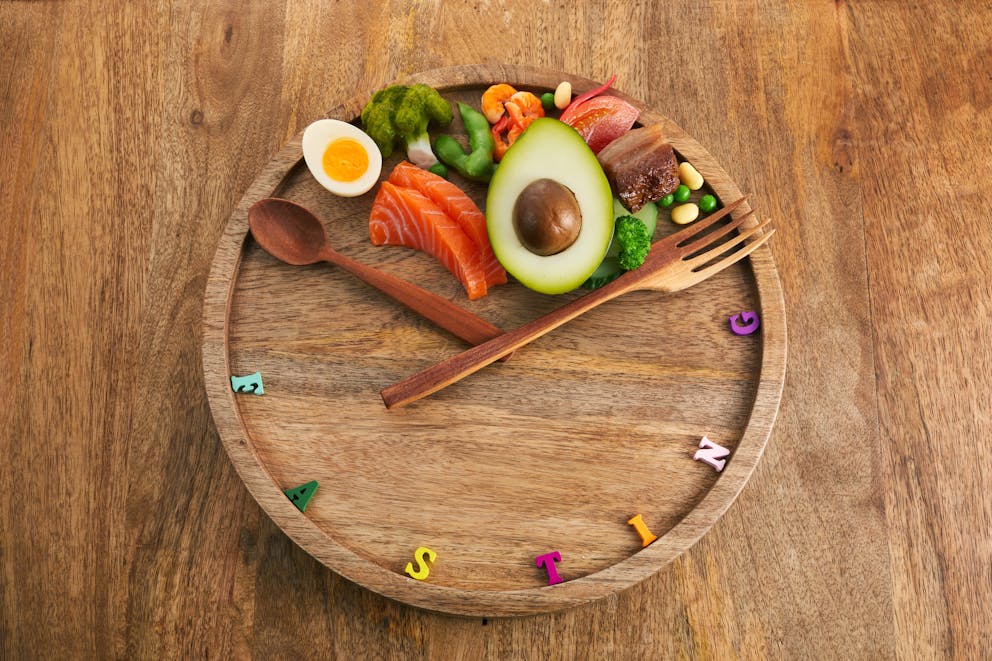Intermittent Fasting For Beginners THE MOST IMPORTANT TIPS
I used to think intermittent fasting was just another fad diet. Boy, was I wrong! When I finally gave it a shot, I realized it's much more than skipping breakfast.
For anyone aiming to lose weight while gaining on the health front and becoming mentally sharper—this might be the breakthrough you’ve been searching for.
So, you're asking yourself why intermittent fasting seems like magic, right? The goal here is simple – we're changing our body's fuel source from sugar to fat burners called ketones.
This simple tweak is like hitting the jackpot - watch as it speeds up melting away fat while making your mind clearer and more focused.
But here's the thing: transitioning to intermittent fasting can be a bit tricky at first. Trust me, I've been there! That's why I want to share some practical tips to make your journey as smooth as possible.
Ready to dive in and discover the life-changing potential of intermittent fasting? Let's go!
Understanding Intermittent Fasting and Its Benefits
Intermittent fasting (IF) has taken the health and wellness world by storm in recent years. This eating pattern involves alternating periods of fasting and eating to shift your body's primary energy source from glucose to ketones.
By making this metabolic switch, you can unlock many potential health benefits beyond weight loss.
As someone who has personally experienced the transformative power of intermittent fasting, I can attest to its effectiveness. When I first started incorporating IF into my lifestyle, I was amazed at how quickly my body adapted and how much better I felt overall.
Not only did I shed stubborn body fat, but I also noticed improvements in my cognitive function, energy levels, and even my skin health.
The Shift from Glucose to Ketones
One of the fundamental mechanisms behind intermittent fasting's many benefits is the shift from using glucose as your body's primary fuel source to relying on ketones instead.
When you fast for an extended period (typically 16 hours or more), your body depletes its glycogen stores and starts breaking down fat for energy.
This process whips up ketones, like a backup fuel your brain and other organs can use when needed.
The transition to running on ketones is often referred to as being in a state of "ketosis."
While it may take some time for your body to adapt to this new metabolic state, once it does, you may notice increased mental clarity, stable energy levels throughout the day, and reduced hunger and cravings.
A Spectrum of Health Benefits
Beyond its potential for promoting fat loss, intermittent fasting has been linked to a wide range of health benefits. Research suggests that IF may help:
Improve insulin sensitivity and blood sugar control
Reduce inflammation throughout the body
Enhance brain function and protect against neurodegenerative diseases
Lower risk factors for heart disease, such as high blood pressure and cholesterol levels
Increase cellular repair and regeneration processes, potentially slowing the aging process
While more research is needed to understand the long-term effects of intermittent fasting fully, the current evidence suggests that this eating pattern may be a powerful tool for improving overall health and well-being.

Transitioning to Intermittent Fasting Smoothly
If you're new to intermittent fasting or looking to refine your approach, it's important to be prepared for the potential challenges during the transition period.
Know the usual signs and eat right. It’s that simple to gear yourself towards victory while keeping things as easy-breezy as possible.
Managing Transitional Symptoms
Some people may experience fatigue, headaches, nausea, or dizziness when starting intermittent fasting. These symptoms are often referred to as the "keto flu" and are typically a result of your body adapting to using ketones for fuel instead of glucose.
Staying hydrated, getting enough sleep, and listening to your body's signals are essential for mitigating these symptoms.
If you're feeling particularly tired or lightheaded, consider breaking your fast early or adjusting your fasting window to a shorter duration until your body adjusts.
Nutrient Optimization During Fasting
While intermittent fasting can be a powerful tool for improving health, ensuring you're still meeting your body's nutritional needs during your eating windows is crucial.
Keeping an eye on consuming adequate amounts of some often-overlooked heroes – namely magnesium, potassium, and B Vitamins– is crucial for staying healthy; they’re fundamental for ensuring everything inside us operates correctly.
Fasting may make your body more prone to nutrient deficiencies, particularly if you don't consume a proper diet during your eating windows.
Consider incorporating nutrient-dense foods like leafy greens, nuts and seeds, and whole grains into your meals to help prevent deficiencies and support overall health.
Additionally, some people may benefit from supplementing with specific nutrients during their fasting journey.
For example, taking a high-quality magnesium supplement before bed can help support restful sleep and reduce muscle cramps, while consuming citrate-rich foods like lemon juice can help counter keto flu symptoms by promoting hydration and electrolyte balance.
Crafting Your Intermittent Fasting Schedule
Have you ever thought a health kick could flex around your schedule? That’s intermittent fasting for you, strikingly versatile. When it comes to choosing how you fast, the options are plentiful.
Every single method has cool benefits but also some challenges waiting for you. Finding the right fasting window and incorporating supportive supplements can create a sustainable IF plan that works for your lifestyle and goals.
Choosing Your Fasting Window
When selecting a fasting window, it's important to consider your daily routine, work schedule, and personal preferences. Some of the most popular intermittent fasting schedules include:
16/8: This involves fasting for 16 hours and eating within an 8-hour window, often by skipping breakfast and having your first meal around lunchtime.
18/6: Similar to the 16/8 method, this schedule involves fasting for 18 hours and eating within a 6-hour window.
20/4: Also known as the Warrior Diet, this more advanced fasting protocol involves a 20-hour fast followed by a 4-hour eating window.
OMAD (One Meal A Day): As the name suggests, this schedule involves consuming all of your daily calories in a single meal, typically within a 1-hour window.
If you're new to intermittent fasting, it's often best to start with a shorter fasting window, such as 16/8, and gradually work your way up to longer fasts as your body adapts. Remember, the key to success with IF is finding a schedule that is sustainable and enjoyable for you in the long-term.
Supplements to Support Your Journey
In addition to focusing on nutrient-dense foods during your eating windows, certain supplements can help support your body's needs while fasting. Some of the most commonly recommended supplements for intermittent fasters include:
Electrolytes: Supplementing with sodium, potassium, and magnesium can help prevent dehydration and maintain proper electrolyte balance, especially during longer fasts.
Omega-3 fatty acids: These anti-inflammatory compounds found in fish oil can help support brain health and reduce inflammation throughout the body.
Probiotics: Supporting gut health with a high-quality probiotic supplement can help improve digestion and nutrient absorption during your eating windows.
Thinking about adding a fresh supplement to the mix? Hold up and talk things over with someone in the know—like a doctor—especially where current meds or pre-existing conditions come into play.
Imagine shaping a unique fasting calendar just for you, complemented by precise nutritional support—this combo paves the way toward unleashing potent advantages hidden within such a dietary strategy, possibly pushing your wellbeing onto new heights.

Fasting Forward
Offers a comprehensive guide to unlocking the potential of intermittent fasting for improved well-being. Delve into the myriad health benefits of intermittent fasting, from weight management to enhanced mental clarity.
Discover expert transition tips to seamlessly incorporate fasting into your lifestyle.
And for those following a keto diet, tantalize your taste buds with the delectable twist of keto French toast—a delicious treat that keeps you in line with your dietary goals while satisfying your cravings.
Whether you're a seasoned faster or just starting, this guide provides invaluable insights and mouthwatering recipes to support your journey towards a healthier you.
Essential Tips for Boosting Your TDEE
Delve into the key strategies that beginners need to maximize their fasting benefits. Understanding how to align your eating windows with your lifestyle, staying hydrated, and choosing nutrient-dense foods are crucial for success.
Incorporating regular exercise can further enhance your total daily energy expenditure (TDEE), making your fasting efforts more effective.
By carefully monitoring your TDEE, you can tailor your fasting and exercise routine to achieve optimal results, ensuring a balanced approach to weight loss and overall health.
Conclusion
Imagine this – with intermittent fasting, you're not only saying goodbye to excess body fat but also welcoming enhanced focus and improved general well-being.
By shifting your body's energy source and giving your digestive system a break, you can tap into many benefits.
Success in intermittent fasting hinges on tailoring its schedule so it feels like second nature within your lifestyle. Whether you choose a 16:8, 18:6, or even a 20:4 eating window, consistency is key.
And don't forget to support your body during the transition! To ease into this new diet adventure smoothly, loading up on essentials like magnesium, potassium and a dash of B vitamins could do wonders for how energized you feel.
So, are you ready to experience the incredible benefits of intermittent fasting for yourself?
Trust me, your body will thank you. Kick things off with baby steps, stick to it without wavering, and marvel as intermittent fasting reshapes both your wellness and lifestyle. You've got this!
Previous blog
The Best Foods for a Recovering Alcoholic
Popular
08/21/2024
47.4K views
05/22/2024
41.5K views
11/18/2024
246.1K views
03/18/2024
11/21/2022




